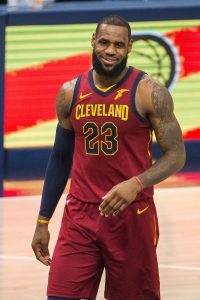In 2016 and 2017, the majority of veterans who held player options for the following season decided to turn down those options, preferring to try their luck on the open market, where teams were handing out record-setting contracts.
In 2018, that trend shifted — with little cap room available around the NBA, most vets chose to pick up their player options and take the guaranteed money. In total, 20 of 28 player options for 2018/19 were exercised.
For a handful of the eight players who opted out of their contracts, the decision was easy — LeBron James, Kevin Durant, and Paul George were at no risk of finding themselves empty-handed on the open market. That wasn’t the case for all eight veterans who turned down their player options though.
Here’s a breakdown of how the eight players who declined options earlier this offseason have fared on the open market:
LeBron James
- Player option: $35,607,968 (Cavaliers)
- New contract: Four years, $153,312,848 (Lakers)
- James’ starting salary with the Lakers is a little higher than what he would have made on his option with the Cavaliers. He’s locked in for $112MM in fully guaranteed money, with a $41MM+ player option for 2021/22.
- Player option: $20,703,384 (Thunder)
- New contract: Four years, $136,911,936 (Thunder)
- Like James, George passed on the opportunity to go year-to-year on his new deal in favor of a massive long-term contract. And like James, George will have the opportunity to make another player-option decision in the summer of 2021 — he’ll earn $99MM+ in the first three seasons of his new contract before deciding on a player option worth nearly $38MM.
Kevin Durant
- Player option: $26,250,000 (Warriors)
- New contract: Two years, $61,500,000 (Warriors)
- Durant could have negotiated a longer-term deal, but opted for a small raise on his player-option salary with an eye toward a more lucrative contract in 2019.
DeAndre Jordan
- Player option: $24,119,025 (Clippers)
- New contract: One year, $22,897,200 (Mavericks)
- Jordan will technically earn a slightly lesser salary in 2018/19 than he would have had he opted in with the Clippers, but he was ready to move on from L.A. and can probably live with the slight pay cut. Plus, the lack of income taxes in Texas will help ensure that Jordan’s earnings don’t really decline.
Rudy Gay
- Player option: $8,826,300 (Spurs)
- New contract: One year, $10,087,200 (Spurs)
- Gay’s raise wasn’t substantial, but his decision to opt out ultimately paid off, even if he’ll return to the same team.
Kyle O’Quinn
- Player option: $4,256,250 (Knicks)
- New contract: One year, $4,449,000 (Pacers)
- While O’Quinn didn’t land the sort of payday he likely sought as a free agent, a modest raise and an opportunity to join a winning team still made opting out the right call.
Joffrey Lauvergne
- Player option: $1,656,092 (Spurs)
- New contract: Two years (Fenerbahce)
- Terms of Lauvergne’s new two-year deal with Fenerbahce weren’t reported, so we don’t know how much he’ll make with the Turkish club. His option was only worth the NBA minimum though, and Fenerbahce is one of the most successful teams in the EuroLeague, so I expect he’s coming out ahead.
Jamal Crawford
- Player option: $4,544,400 (Timberwolves)
- New contract: Still unsigned
- Even though Crawford has suggested that finding the right fit is more important than money at this point in his career, it’s still fair to question his option decision, given that he remains without an NBA home. I think he’ll sign somewhere eventually, but I don’t know that he’ll get more than the veteran’s minimum ($2,393,887), which would be worth just over half of his option salary.
Photo courtesy of USA Today Sports Images.
I think Rudy Gay earning a ~2 million dollar raise is substantial. 2 million dollars is a lot of money, and he multiplied his contract by 125%.
DeAndre Jordan is going to make more money in Dallas.
Mostly all fared better, Crawford will get a gig, that’s for sure. Only Lauvergne might not, but then again he really isn’t a great player, right?
It paid off to bet on themselves. The other 20 might be wondering themselves… maybe not.